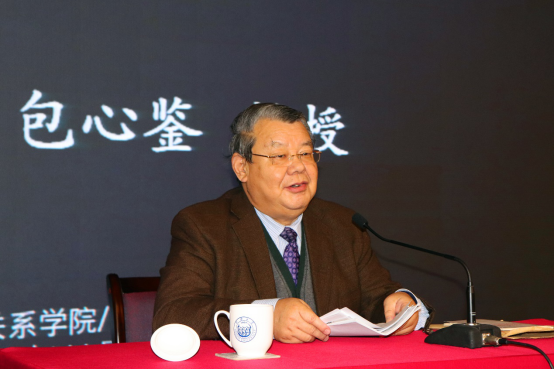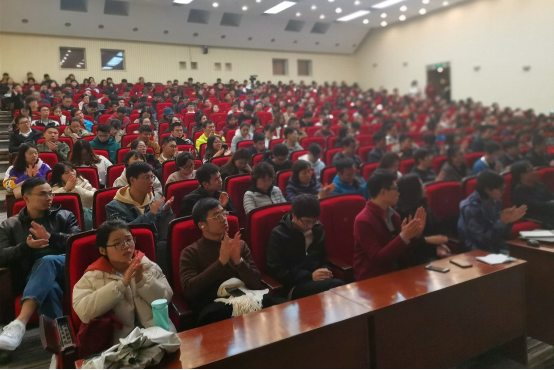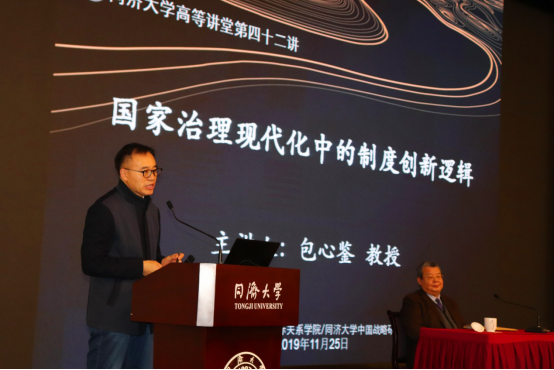
Hosted by the Institute for China & World Studies and the School of Political Science & International Relations (SPSIR) of Tongji University, the Tongji Serial Lectures on Social Sciences No.20 & the Tongji Advanced Lectures for Graduate Students No.42 was successfully held in the lecture hall on the first floor of Yifu Building, Siping Campus, Tongji University on November 25, 2019. Professor Bao Xinjian, Vice President of the Chinese Association of Political Science, former Deputy Secretary of the Leading Party Members' Group and Vice President of Shandong Federation of Social Sciences, a distinguished professor of Shandong University, and Honorary Dean of the School of Political Science and Law at University of Jinan, was invited to give a speech on the topic of "The Logic of Innovation in the Modernization of China’s System and Capacity for Governance". Professor Men Honghua, Dean of SPSIR, moderated this lecture.

Based on his understanding of the documents related to the Fourth Plenary Session of the 19th Central Committee of the Communist Party of China (CPC), Prof. Bao explained the logic of innovation in the modernization of China’s system and capacity for governance in four parts, i.e. "awareness of and confidence in Chinese system", "importance of institutions and governance through institutions", "institutional logic and advantages", and "consciousness and authority of institutions".
First of all, Prof. Bao explained how the CPC has achieved institutional awareness of and confidence in Chinese system from the three dimensions of history, reality and future. He pointed out that the CPC has gradually come to the conclusion that "Institutional development is a long-term, all-encompassing endeavor of vital importance that provides stability and continuance" by constantly summing up historical experiences. From a historical perspective, the CPC’s development path of institutional theory is mainly reflected in the four important nodes of awakening. In terms of reality, the CPC has made great historical achievements in the reform and opening up, but it is also facing formidable challenges. In particular, with the comprehensive deepening of the institutional reform, China is faced with the urgent task of making institutions more mature. Looking into the future, the Party’s goal is to further deepen the institutional reform, promote institutional innovation and make institutions more mature, and incorporate these efforts into the whole process of China's modernization drive, Prof. Bao noted.
Next, Prof. Bao elaborated on "the importance of institutions and governance through institutions". He pointed out that institutions are the key to governance, institutional modernization underpins governance modernization, and institutional modernization is the fundamental standard of governance. On this basis, the importance of institutions is mainly manifested in the following two aspects: first, the institutional system is the core component of the national governance system; and second, institutions provide the fundamental support for the modernization of China’s system and capacity for governance. To maximize the effect of "governance through institutions", the key is to concentrate on the themes and key points of institutions so as to unleash the institutional advantages and push forward the modernization drive. Prof. Bao pointed out that the theme of the 13 aspects of the "institutional reform and innovation" in the Communiqué of the Third Plenary Session of the 19th CPC Central Committee is to organically combine the above-mentioned three efforts into the Party’s institutional development. Priority should be given to the reform of leadership system, and the main task is to reform the system of institutions through which the people run the country under the leadership of CPC.
Subsequently, Prof. Bao made an in-depth analysis of the "institutional logic and advantages". He asked: how did the Chinese system come into being, and what are its special advantages? This is also what we need to further study in learning the Fourth Plenary Session. The session has defined the nature of the Chinese system, i.e. the socialist system with Chinese characteristics is a set of institutions or a governance system that is guided by Marxism, takes root in the land of China, has a deep foundation in Chinese culture, and is strongly supported by the Chinese people. Based on this, he elaborated on his viewpoint that “the system has its inherent formation logic, and the system itself has its own special superiority” from the three levels of "the Chinese system is an organic unity of the CPC and its people, an organic unity of deepening reform and becoming more mature, and an organic unity of inheritance and modernity".
Finally, Prof. Bao gave a brief explanation on the "consciousness and authority of institutions" which is contained in the last part of the Communiqué. Key points include grasping the institutional connotation, strengthening the consciousness of institutions, and upholding the authority of institutions.

Throughout this lecture, Prof. Bao not only explained several important concepts about China’s national governance in the Communiqué of the Fourth Plenary Session, but also shared his own unique theoretical analysis and understanding. In the following Q&A interaction, he carefully answered many students’ questions, inspiring them to think deeply.
Dean Men expressed sincere respect for Prof. Bao's wonderful lecture. He pointed out that Prof. Bao spoke closely around "the importance of institutions" and interpreted the key points of the Fourth Plenary Session of the 19th CPC Central Committee from the perspectives of political science and Party history; and analyzed the relationship of institutional reform, shaping and innovation from a historical perspective. In particular, he put forward many innovative views on how to make the socialist system with Chinese characteristics more mature. This lecture provided the audience with extensive content, ranging from decision-makers’ strategic thinking to policy details of community governance. Prof. Bao delivered the audience a valuable lesson on the CPC history as well as ideology and politics, and on the spirit of the Fourth Plenary Session, which is worthy of further study and thinking by everyone present.







